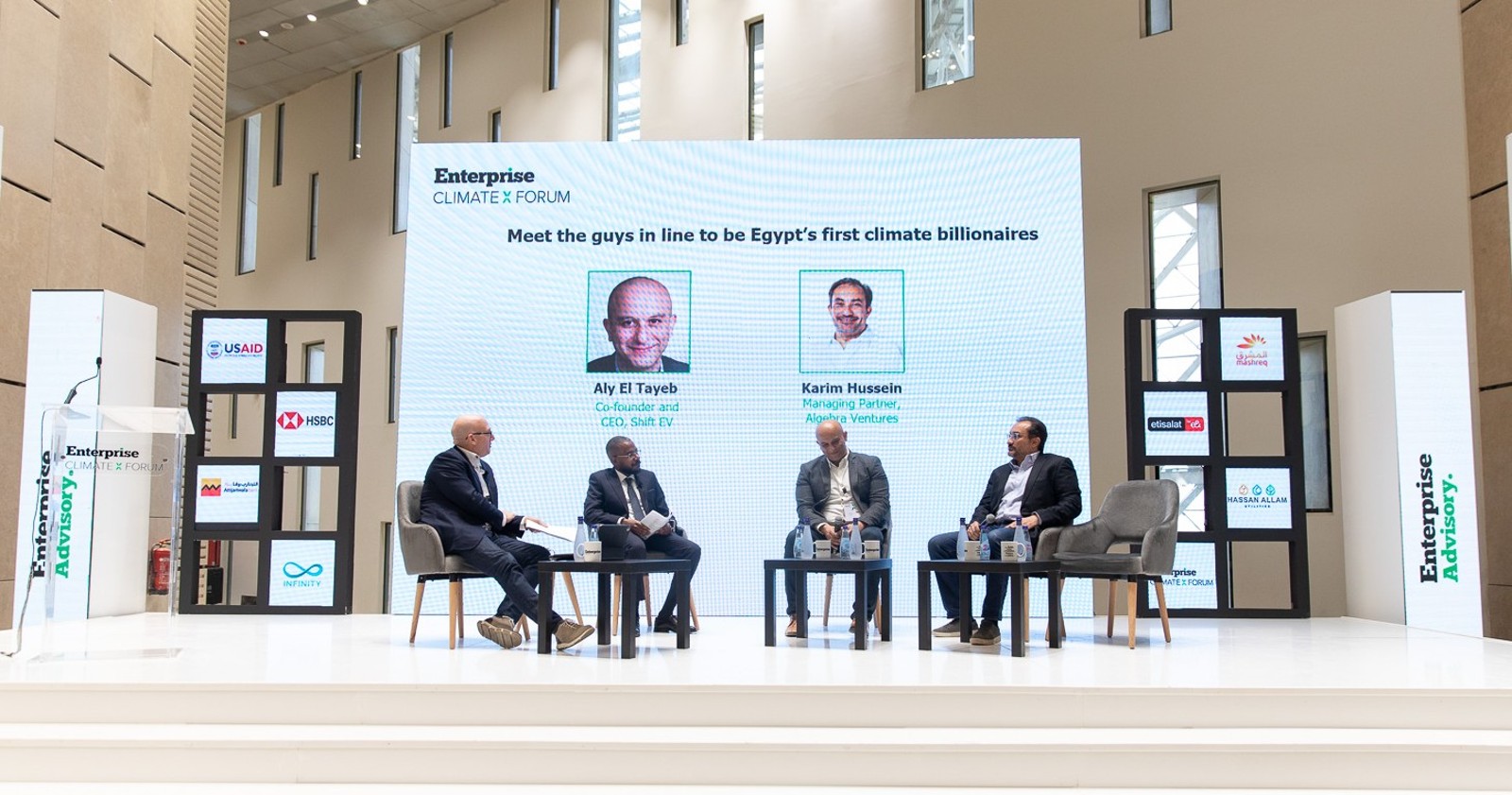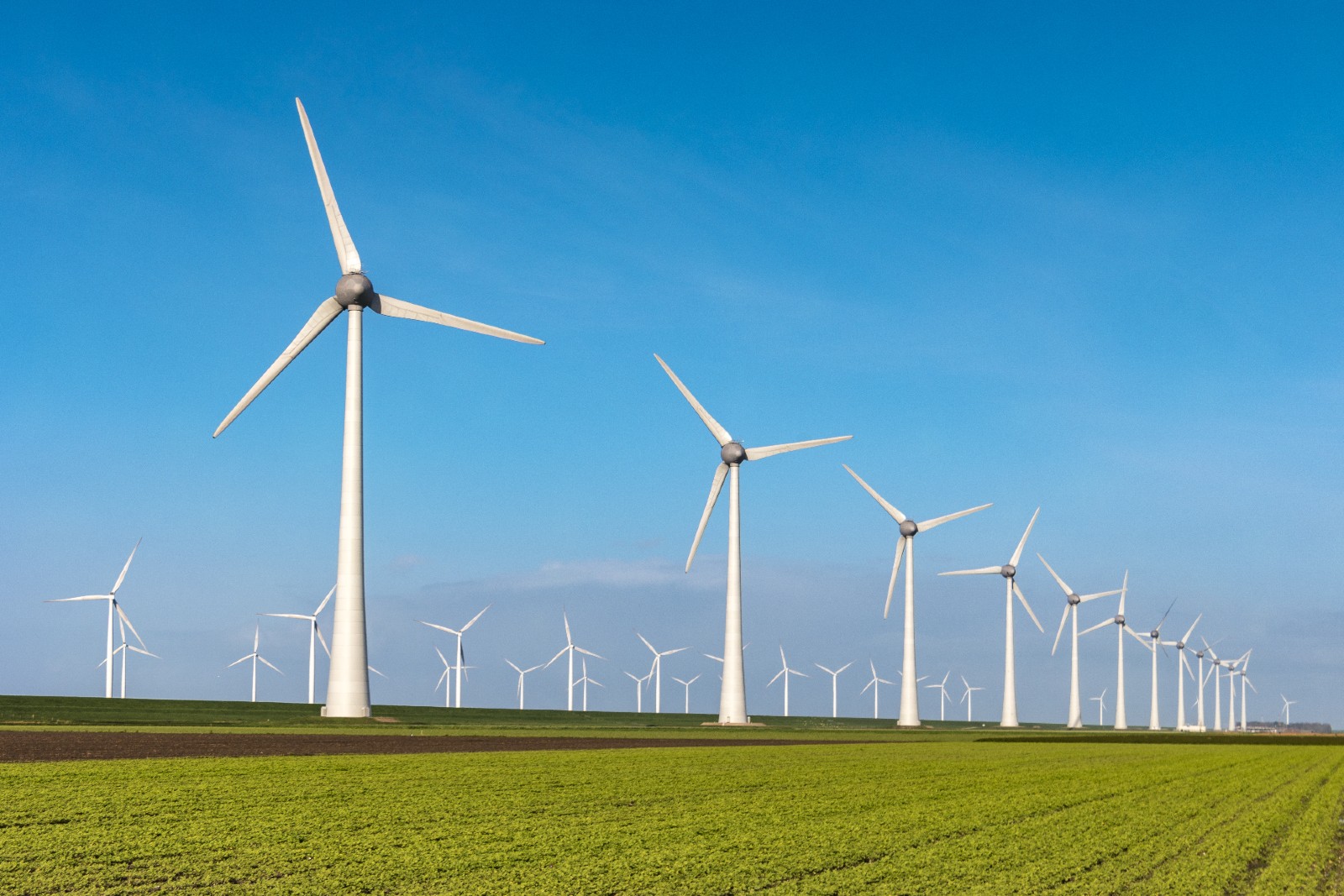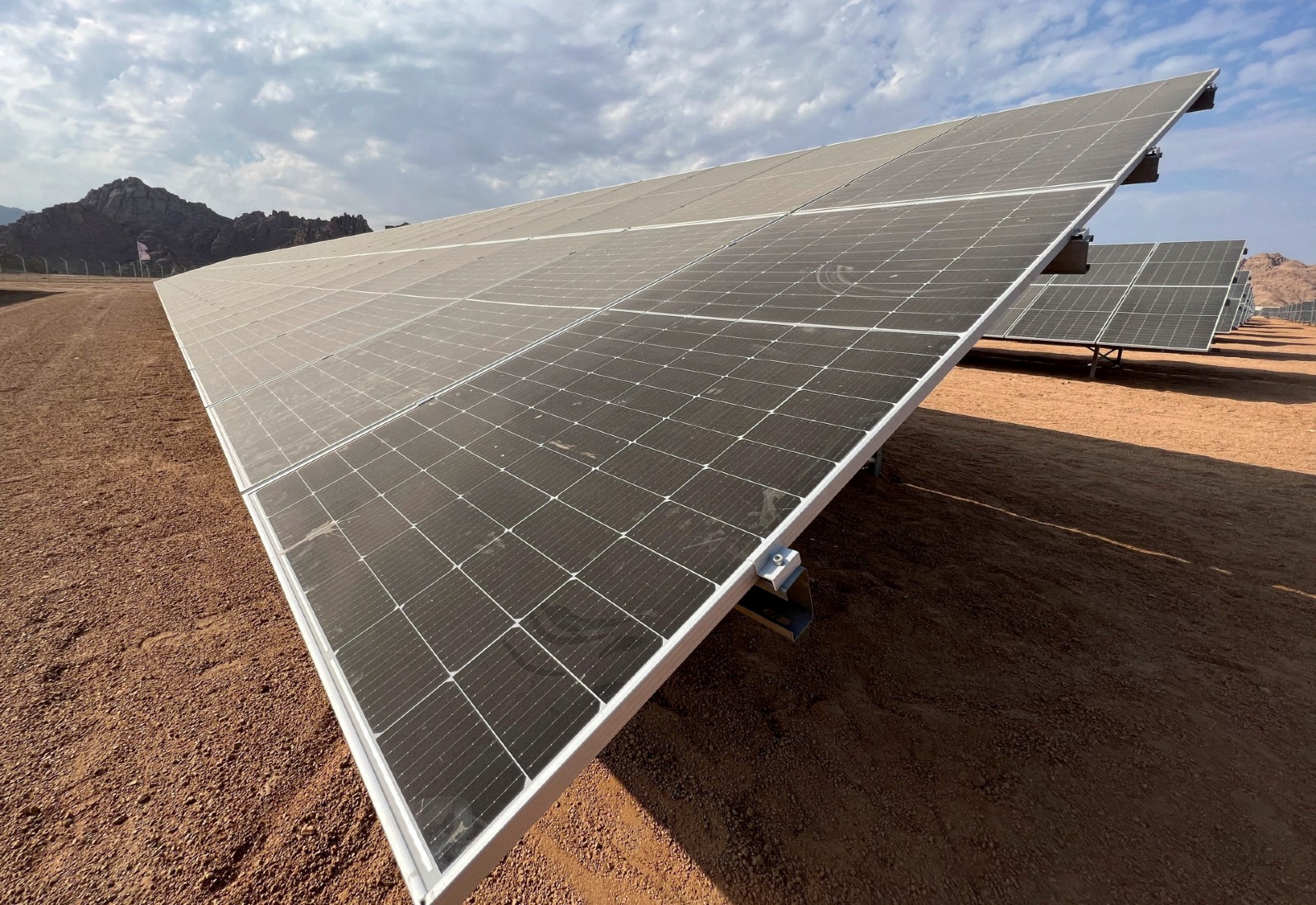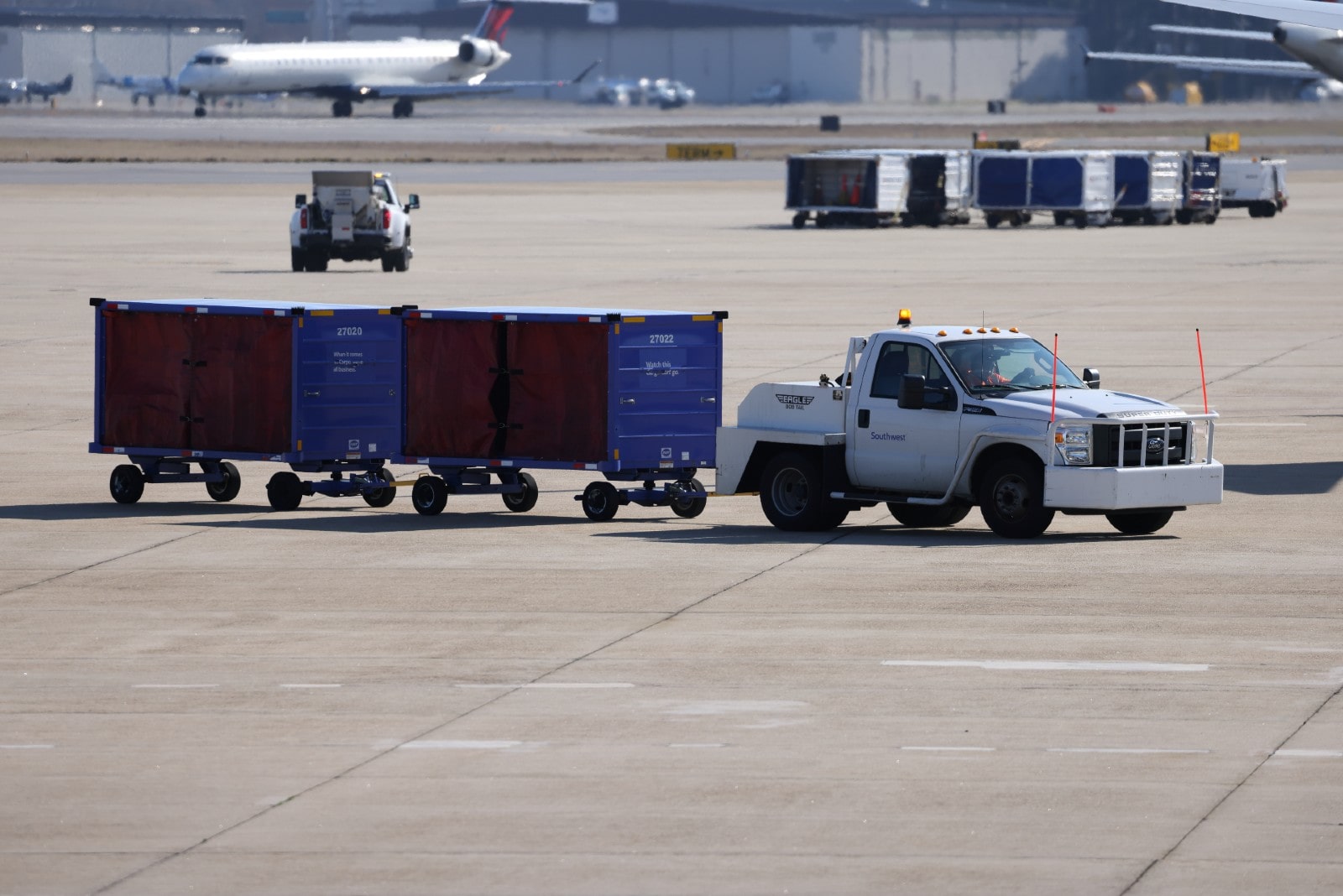- KSA’s PIF acquires a stake in German offshore wind developer and operator. (Investment Watch)
- Shift EV and Algebra Ventures on how to build a USD bn climate business. (Enterprise Climate X Forum)
- The UAE and Kyrgyzstan agree to begin construction on a 200 MW solar plant. (Solar)
- Air Products is bringing clean hydrogen to ground services at KSA’s Dammam Airport. (Hydrogen)
- EU agrees on first ever “green tariff” for high emissions imports. (What We’re Tracking Today)
- Scientists in California achieved a brief net energy gain in a nuclear fusion experiment using lasers. (What We’re Tracking Today)
- Western Europe’s wind drought is affecting the energy generation of wind turbines. (Danger Zone)
- Controlling human traffic with national border walls is bad news for wildlife. (On Your Way Out)

Wednesday, 14 December 2022
Saudi Arabia’s PIF acquires a stake in Germany’s Skyborn Renewables
TL;DR
WHAT WE’RE TRACKING TODAY

Good morning, friends. We’re rolling into the weekend and the news cycle appears to be slowing down as folks get ready for the festive season.
We hope everyone is getting amped for an adrenaline-pumping night of football as Morocco’s Atlas Lions face off against France at 11pm Dubai time. We’ll be glued to our screens and ready for another night of celebration — fingers crossed.
THE BIG CLIMATE STORY- Saudi Arabia’s Public Investment Fund has acquired a 9.5% stake in German offshore wind developer and operator Skyborn Renewables, continuing its heavy decarbonization investments till the final weeks of the year.
ALSO- The UAE and Kyrgyzstan inked an agreement to begin construction on a 200 MW solar plant in Kyrgyzstan.
^^ We have chapter and verse on these stories and more in the news well, below.
WATCH THIS SPACE #1- FedEx begins EV trials in the UAE: FedEx Express will run a six-month pilot study using a new EV fleet as part of the UAE’s 2040 carbon neutrality target, according to a statement released yesterday. The new fleet will transport parcels across strategic spots throughout the country. The courier company has launched similar initiatives in India, South Africa, and others with the largest EV fleet operating in China. FedEx aims to bring its EV fleet to 50% of its vehicles by 2025 and to transition to a fully green fleet by 2030.
WATCH THIS SPACE #2- Will Qatar invest in Siemens Energy? Siemens Energy is on a quest for new investors which could include the Qatar Investment Authority, according to Handelsblatt (German). The company needs a capital injection to pursue a full acquisition of its wind power subsidiary Siemens Gamesa and is eyeing sovereign wealth funds, the media outlet writes.
THE BIG CLIMATE STORY OUTSIDE THE REGION- EU agrees on first “green tariff” for high emissions imports: In a global first, the EU reached a provisional agreement early yesterday morning to impose a CO2 emissions tariff on imports of highly-polluting goods. The aim is to launch the carbon border adjustment mechanism on a trial basis starting October 2023. Under the new agreement, companies importing iron, steel, cement, fertilizers, aluminum, hydrogen and electricity from outside the EU will have to buy certificates to cover the cost of emissions — an attempt to align costs with domestic production, avoid industrial outsourcing to countries with lower environmental standards, and push partner countries to decarbonize. EU domestic producers already have to buy permits for carbon emissions under the bloc’s trading scheme.
The story is getting plenty of ink globally: Guardian | Reuters | Financial Times | New York Times | AP | Bloomberg.
And the big nuclear fusion news was confirmed: Scientists at a US government lab in California briefly achieved a net energy gain in a nuclear fusion experiment using lasers last week, US Energy Secretary Jennifer Granholm announced at a press briefing organized yesterday by the US Energy Department (watch, runtime: 2:37). This could mark a major breakthrough in the application of nuclear technology as a clean energy source, although scientists and researchers cautioned that it will likely be decades before the technology is commercially viable — if ever. The story got ink in the New York Times, the Washington Post, and Bloomberg.
Need a recap on nuclear fusion? We’ve got you covered.
|
***
YOU’RE READING ENTERPRISE CLIMATE, the essential MENA publication for senior execs who care about the world’s most important industry. We’re out Monday through Thursday at 4am Cairo / 5am Riyadh / 6am UAE.
Were you forwarded this email? Get your own subscription without charge here or reach out to us on climate@enterprisemea.com with comments, suggestions and story tips.
***
THE DANGER ZONE- Wind power producers are feeling the pinch as Western Europe suffers through wind drought, Sky News reports. Wind was responsible for 28% of the UK’s electricity generation last year. Europe’s previous wind drought in 2021 impacted businesses including Danish energy company Orsted, which reported losses of USD 366 mn due to the decrease of wind speeds and Germany’s RWE, whose net income from its solar and wind farms fell 38%, Big Think writes.
What does this mean for us? MENA companies and governments are heavily investing in wind energy projects inside and outside the region. The latest investment is Saudi Arabia’s sovereign wealth fund’s acquisition of a stake in German wind developer Skyborn Renewables — we have the full story in the news well below.
SOUND SMART- Wind droughts describe periods when wind speeds drop, which lowers the energy production capacity of existing wind farms. The reliance of many European countries on wind in their energy mix will further squeeze utilities burdened by the cut-off of Russian natural gas.
CLIMATE DIPLOMACY- Egypt will follow up on COP27’s climate finance and investments pledges at next year’s G20 meeting in New Delhi, according to a statement released yesterday. The COP27 host reiterated developing countries’ commitment to support emerging economies in mitigation and adaptation as well as a just green transition. Egypt also reemphasized the need for private investments in key industries like food and energy as well as “[establishing] a center of excellence for research purposes in the field of green hydrogen,” Egypt’s representative at the G20 Meeting and Assistant Foreign Minister Ragy El Etreby said.
CIRCLE YOUR CALENDAR-
The UAE will host the Sharjah Entrepreneurship Festival this Saturday, 17 December and Sunday, 18 December at the Sharjah Research Technology and Innovation Park where leading entrepreneurs will engage in over 50 panels covering sustainable innovation, clean mobility, and solar-powered vehicles.
Saudi Arabia will host the Future Minerals Forum on Tuesday, 10 January to Thursday, 12 January at the King Abdulaziz International Conference Center. The forum will discuss the region’s critical minerals supply and creating resilient and responsible minerals value chains for the energy transition.
UAE renewable energy firm Masdar will host Abu Dhabi Sustainability Week from Saturday, 14 January to Saturday, 21 January. The event will gather eight presidents and prime ministers and 30k participants in a series of conferences and summits including the Atlantic Council’s Global Energy Forum, the World Future Energy Summit, Masdar’s Green Hydrogen Summit, The International Renewable Energy Agency’s Youth Forum, and the Abu Dhabi Sustainable Finance Forum.
Check out our full calendar on the web for a comprehensive listing of upcoming news events, national holidays and news triggers.
ENTERPRISE CLIMATE X FORUM

Shift EV and Algebra Ventures on how to build a successful green business: We sat down with Algebra Ventures Managing Partner Karim Hussein (LinkedIn) and Shift EV CEO Aly El Tayeb (LinkedIn) at the Enterprise Climate X Forum last week for a deep dive into how some successful climate-friendly business are proof of concept for all the climate investment and green growth we discussed at the forum.
Case in point? Egyptian electric mobility startup Shift EV has built a green-energy focused business targeting the acceleration of Egypt’s EV transition — all while overcoming regulatory and market challenges. The potential of their model led Egypt-based venture capital fund Algebra Ventures — which backs tech-focused startups that seek to transform industries, but which isn’t a climate fund — to stretch its mandate to invest in the venture.
Shift EV produces EVs by taking existing vehicles and replacing their internal combustion engines with its own-design, made-in-Egypt battery packs, said El Tayeb. The process costs a few thousand USD and can be done in a couple of hours per vehicle, he added.
There’s significant savings involved: Upfront costs are low and by switching to electric, customers — many of whom are fleet owners operating in delivery or logistics — save some 80% of their operating costs. Commercial EVs are also broadly unaffordable for the MENA market: “It’s a no-brainer that the [USD 70k] Rivian pickup truck won’t be moving groceries in Egypt this decade or next,” El Tayeb said.
Shift EV offers a solution with economic and environmental benefits: Only 10% of the new vehicles added to the road every year are EVs, suggesting a 50-year timeline for a full global transition to EV usage, which is “unacceptable, from an economic and climate perspective,” said El Tayeb.
The company started small and initially self-financed, starting by building prototypes of the vehicles and batteries then testing the waters with prospective customers. When they set up a company at the end of 2020, they decided not to raise capital. They had potential revenue streams — with demand for their batteries as an independent product notably high — and no substantial overheads, El Tayeb noted.
What changed: They decided to raise capital for the chance to work with investors they respected and were aligned with, and to capitalize on the growth prospects. “It didn’t make sense to operate for five years at a bootstrapped, slow pace when we could build something faster,” El Tayeb said. Shift EV raised about USD 9 mn last year, he added.
From Algebra’s perspective, Shift EV’s model and scaling potential made it an appealing investment. “They had the right experience and were a cohesive group,” Hussein said. “We thought it was an elegant solution to a very pressing problem.”
Shift EV has also overcome many of the issues that were there when it first pitched to Algebra: “There wasn’t a factory, or regulation in place to allow for retrofitting when Aly first pitched to us,” Hussein said, but El Tayeb and his team broke barriers. As of a few months ago, Shift EV’s retrofitted vehicles can be fully (and simply) licensed by the authorities in Egypt. Customers bring their vehicles to Shift EV’s factory, they’re converted, and the company provides a letter to Egypt’s Interior Ministry, which then provides customers with a license, said El Tayeb.
How they got there: A lesson on working with regulators: “We assumed regulators were technical experts who wanted technical guarantees that what they’re allowing customers to use is safe,” said El Tayeb. Shift EV used global EV safety standards for reference and then piggybacked on the process of establishing the technical safety of new cars. When all paperwork and test results were presented to the relevant authorities, what was ultimately needed was a small change in the Interior Ministry’s internal regulations, said El Tayeb.
Articulating a clear value proposition was an important part of the process, El Tayeb said.
The Shift EV team was able to demonstrate that the company meets several important needs for Egypt — attracting FDI to manufacturing and addressing the cost challenge of the EV transition, he said. “We weren’t asking for massive subsidies — just the freedom to operate,” he added.
Now the company’s big priority is scaling: “We have a product, factory, and regulatory framework that all work, and we have a customer base that’s strong and growing. So we’ve been thinking, how does this business look at scale?” El Tayeb said.
Equity financing is one way to scale: Along with Algebra, Shift EV has several other investors — including US-based VC Union Square Ventures. Still, “in the end we don’t want to convert every vehicle in the world on equity,” he added.
Carbon credits could eventually play a major role: “Carbon credits are real” and voluntary carbon markets are a great avenue for financing, although this isn’t tangible for Shift EV today, El Tayeb said. There was a growing market for them in Egypt in 2007, and though priorities shifted when the financial crisis hit in 2008, they’re likely to make a comeback, he added.
Emerging tech could help to develop the carbon credit market — particularly overcoming the existing challenges of verification and certification, noted Hussein. “I think there are a bunch of businesses working in data, analytics and certification, where technology can act as an enabler, to unlock carbon credits and enable a company like Shift EV to be able to access them and trade them on the market,” he added.
Financing bodies need to be aware that they’re helping to grow the asset classes of the future, El Tayeb added. “There are in Egypt 1.5 mn vehicles and fleets that need to become electric, and we need to find a way to finance that.” This is a new asset class — one that we could think of as being comparable to future solar projects, El Tayeb added.
It’s all about demonstrating bankability: Establishing bankability starts with one small agreement with a financial institution, allowing companies to continue proof of concept and paving the way for “a flood of capital,” said El Tayeb. Though concessionary climate finance is increasing globally, a greater selection of bankable projects is still needed, he said. “But they can’t all be megaprojects. It has to also be a new class of problems, which require a new class of solutions — and that’s very difficult to finance today.”
Looking at VC climate tech investment more broadly, Hussein identified several areas of potential interest, including using tech for waste reduction and logistical efficiency in agriculture; supportive tech for large infrastructure projects — ranging from tech that monitors energy usage or increases energy efficiency to tech that uses chemicals and nanotechnology to repel dust from solar panels, reducing maintenance costs; and tech that makes reuse and recycling more efficient.
But some interesting fields might require a rethink of financing structures: While there are interesting prospects in using biomass as feedstock for local production, it’s a challenging area for VC investors since life sciences are very long-term investments, noted Hussein. Manufacturing investments — also arguably underrepresented from a VC perspective — could work best with an investment vehicle somewhere between a VC and private equity that can support very early-stage businesses, with a clear growth trajectory and a de-risked tech structure, Hussein added.
** The Enterprise Climate X Forum is proud to be supported by USAID, HSBC, Mashreq, Attijariwafa Bank, Etisalat by e&, Hassan Allam Utilities, and Infinity.
M&A WATCH
PIF acquires stake in Germany’s Skyborn Renewables, continuing the GCC shopping spree

KSA’s PIF snaps up more European renewables: Saudi Arabia’s Public Investment Fund (PIF) is acquiring up to 9.5% in Germany’s offshore wind developer and operator Skyborn Renewables, according to a statement. The value of the transaction was not disclosed.
PIF isn’t the only sovereign wealth fund involved with the German company: UAE’s sovereign wealth fund Mubadala Investment Company acquired an undisclosed stake in Skyborn in October.
Who owns what: Prior to Mubadala’s investment, US infrastructure fund Global Infrastructure Partners (GIP) acquired (pdf) 100% of Skyborn Renewables in September.
Who is Skyborn Renewables? Skyborn — formerly known as WPD Offshore before it was acquired by GIP — has wind energy projects generating some 7 GW of clean energy with a further 30 GW of offshore projects in the pipeline. The company is very active in Europe and the Asia Pacific markets with projects in countries including Germany, France, and Taiwan.
PIF has been quite active on the decarbonization front: The fund had auctioned off 1.4 mn tons of carbon credits in October, while a JV between its subsidiary Badeel and Acwa Power signed a PPA for a 2.06 GW solar plant in Saudi Arabia earlier this month. PIF invested over USD 1 bn in US EV manufacturer Lucid Motors in 2019, while the fund’s JV Ceer — KSA’s first EV company — recently secured a site for an EV factory. Additionally, PIF signed a USD 6.5 bn agreement with Korea Electric Power Corp and other Korean firms to build a hydrogen and ammonia plant in Saudi Arabia.
Another check on the list of ongoing GCC acquisitions: GCC funds and companies have been increasingly investing in European and US renewable energy companies this year. The UAE’s sovereign wealth fund Mubadala Investment Company acquired stakes in US offshore project Bluepoint Wind for an undetermined amount in October. GCC-focused alternative asset manager Wafra also acquired a majority stake in US utility-scale renewable asset developer Mission Clean Energy, and Kuwait-based Agility Ventures made a USD 40 mn investment in US EV charging station company Loop Global. This is just to name a few.
SOLAR
UAE and Kyrgyzstan agree to start construction on 200 MW solar plant

The UAE and Kyrgyzstan signed an agreement to start constructing the first phase of a 200 MW solar plant in the Central Asian country, state news agency Wam reports. No details about the project’s investment size or involved parties were given. The signing came among a slew of agreements between the two countries in various sectors including tourism, agriculture, and technology.
Is this the same plant Masdar was eyeing? UAE’s Masdar had also expressed interest in building a 200 MW solar plant back in April, Kyrgys national news agency Kabar wrote, along with inking “initial pacts'' with Kyrgyzstan’s Energy Ministry to look into renewable energy projects — including floating solar and hydropower projects amounting to a capacity of 1 GW.
Masdar has been expanding in Central Asia: The company signed a joint development agreement with Turkmenenergo State Power Corporation last month to build a 100 MW solar plant in Turkmenistan. Back in September, Masdar achieved financial close on Central Asia’s largest wind farm in Uzbekistan, boasting a capacity of 500 MW.
And it ties in with the GCC widening its renewables foothold in Asia: Saudi Arabia’s Acwa Power also signed quite a few renewable energy agreements across the continent. It signed a non-binding MoU for a 1 GW solar project in Bangladesh last month and renewable energy battery storage and green hydrogen facilities in Indonesia. Saudi Aramco is also conducting feasibility studies for a hydrogen and ammonia value chain in Indonesia.
HYDROGEN
Air Products is bringing clean hydrogen to ground services at KSA’s Dammam Airport

Saudi Ground Services is getting clean hydrogen: Air Products Qudra — the development and investment company of Air Products in the Middle East — inked an agreement to supply clean hydrogen for Saudi Ground Services to fuel ground handling services in Dammam Airport, according to a statement released this week.
The details: The partnership will see the airport’s full range of ground services — including transporting passengers, baggage handling, refueling trucks and more — fueled by hydrogen in a bid to lower the industry’s carbon footprint in line with the Saudi Green Initiative and Saudi Vision 2030. No further details have been announced as of yet.
On the ground and up above: This first ever application of clean hydrogen in the ground handling aviation sector in Saudi previous efforts matches the aviation industry’s attempts to decarbonize the skies. Qatar Airways and Etihad Airways have recently explored sustainable alternative fuels (SAFs) as low-carbon alternatives to traditional jet fuel to curb greenhouse gas emissions.
And the sky's not the limit: Air Products — along with Acwa Power and NEOM — is part of a JV to develop NEOM’s USD 5 bn Green Hydrogen Project. The venture will deliver the world’s largest utility scale green hydrogen facility expected to be commissioned in 2026 with a 650 tonnes/day production capacity.
ON YOUR WAY OUT

Like the Berlin Wall, but for wildlife: Animal families are being split up thanks to a 185 km wall border recently constructed between Poland and Belarus to keep refugees out, BBC reports. The wall cuts through a forest and has halted migrating wildlife from taking their path. The European Commission in Brussels had tried to stop the construction, as it could result in “the collapse of the Polish lowland lynx population,” threatening the local extinction of the species. Climate change is already threatening 35% of mammals globally due to changing weather patterns that alter their surroundings, forcing them to migrate and keep moving.
CALENDAR
DECEMBER
7-19 December (Wednesday-Monday): The UN’s 15th meeting of the Conference of the Parties to the Convention on Biological Diversity (COP15), Montreal, Canada.
13-14 December (Tuesday-Wednesday): Seminar on EU standards for agri-food products for the Gulf Cooperation Council countries, Grand Millennium Business Bay Hotel, Dubai, UAE.
13-15 December (Tuesday-Thursday): International Renewable Energy Congress, Hammamet, Tunisia.
17-18 December (Saturday-Sunday): Sharjah Entrepreneurship Festival, Sharjah Research Technology and Innovation Park, UAE.
JANUARY 2023
10-12 January (Tuesday-Thursday): The Future Minerals Forum, Riyadh, Saudi Arabia.
12 January (Thursday): Business Transition to Net-Zero – the Path Towards a Successful Low-Carbon Future Forum, Bahrain.
13 January (Friday): The International Renewable Energy Agency’s Youth Forum, Abu Dhabi, UAE.
14-21 January (Saturday-Saturday): Abu Dhabi Sustainability Week, Abu Dhabi, UAE.
16-18 January (Monday-Wednesday): EcoWASTE, Abu Dhabi National Exhibition Center (ADNEC), UAE.
16-18 January (Monday-Wednesday): World Future Energy Summit, Abu Dhabi National Exhibition Center (ADNEC), UAE.
January 2023: Bid submission deadline for green hydrogen projects to Hydrogen Oman (Hydrom).
FEBRUARY 2023
6-8 February (Monday-Wednesday): Saudi International Marine Exhibition and Conference, Hilton Riyadh, Saudi Arabia.
21-22 February (Tuesday-Wednesday): The Arab Green Summit, Dubai, UAE.
21-23 February (Tuesday-Thursday): World Environment, Social and Governance (ESG) Summit, Dubai, UAE.
MARCH 2023
15-19 March (Wednesday-Sunday): Qatar International Agricultural and Environmental Exhibition, Doha, Qatar.
MAY 2023
1-4 May (Monday-Thursday): Arabian Travel Market, Dubai World Trade Centre, Dubai, UAE. Register here.
29-31 May (Monday-Wednesday): Electric Vehicle Innovation Summit, Abu Dhabi National Exhibition Centre, Abu Dhabi, UAE.
JUNE 2023
Bloomberg New Economy Gateway Africa Conference, Marrakesh, Morocco.
1-3 June (Thursday-Saturday): Envirotec and Energie Expo, UTICA, Tunis, Tunisia.
SEPTEMBER 2023
Chariot Limited and Total Eren’s feasibility study on a 10 GW green hydrogen plant in Mauritania to be completed.
OCTOBER 2023
2-4 October (Monday-Wednesday): WETEX and Dubai Solar Show, Dubai World Trade Centre, Dubai, United Arab Emirates.
NOVEMBER 2023
6-17 November (Monday-Friday): The UAE will host COP28.
EVENTS WITH NO SET DATE
End-2022
KSA’s Neom wants to tender three concrete water reservoir projects to up its water storage capacity by 6 mn liters.
2023
Early 2023: Egypt’s KarmSolar to launch KarmCharge, the company’s EV charging venture.
1Q2023: Oman will award two blocks of land for green hydrogen projects in Duqm, Oman.
Mid-2023: Sale of Sembcorp Energy India Limited to consortium of Omani investors to close.
Phase C of the 900-MW of the Mohammed bin Rashid Al Maktoum Solar Park in Dubai to be completed.
Saudi Basic Industries Corporation (Sabic) steam cracker furnace powered by renewable energy to come online.
4Q2023: Oman to award four blocks of land for green hydrogen projects in Thumrait, Oman.
2024
End-2024: Emirati Masdar’s 500 MW wind farm in Uzbekistan to begin commercial operations.
QatarEnergy’s industrial cities solar power project will start electricity production.
First 1.5 GW phase of Morocco’s Xlinks solar and wind energy project to be operational.
2025
Second 1.5 GW phase of Morocco’s Xlinks solar and wind energy project to be operational.
UAE to have over 1k EV charging stations installed.
2026
1Q 2026: QatarEnergy’s USD 1 bn blue ammonia plant to be completed.
End-2026: HSBC Bahrain to eliminate single-use PVC plastic cards.
Iraq’s Mass Group Holding wants to invest EUR 1 bn on its thermal plant Mintia in Romania to have 62% of run on renewable energy, while expanding its energy capacity to at least 1.29k MWh.
2027
MENA’s district cooling market is expected to reach USD 15 bn.
2030
UAE’s Abu Dhabi Commercial Bank (ADCB) wants to provide AED 35 bn in green financing.
UAE targets 14 GW in clean energy capacity.
Tunisia targets 30% of renewables in its energy mix.
Qatar wants to generate USD 17 bn from its circular economy, creating 9k-19k jobs.
Morocco’s Xlinks solar and wind energy project to generate 10.5 GW of energy.
2035
Qatar to capture up to 11 mn tons of CO2 annually.
2045
Qatar’s Public Works Authority’s (Ashghal) USD 1.5 bn sewage treatment facility to reach 600k cm/d capacity.
2060
Nigeria aims to achieve its net-zero emissions target.
Enterprise Climate is available without charge thanks to the generous support of HSBC (tax ID: 204-901-715), the leading corporate and retail lender in Egypt; and Infinity Power (tax ID: 305-170-682), the leading generator and distributor of renewable energy in Africa and the Middle East. Enterprise Climate is delivered Mon-Thurs before 4 am UAE time. Were you forwarded this copy? Sign up for your own delivery at climate.enterprise.press. Contact us on climate@enterprisemea.com.

